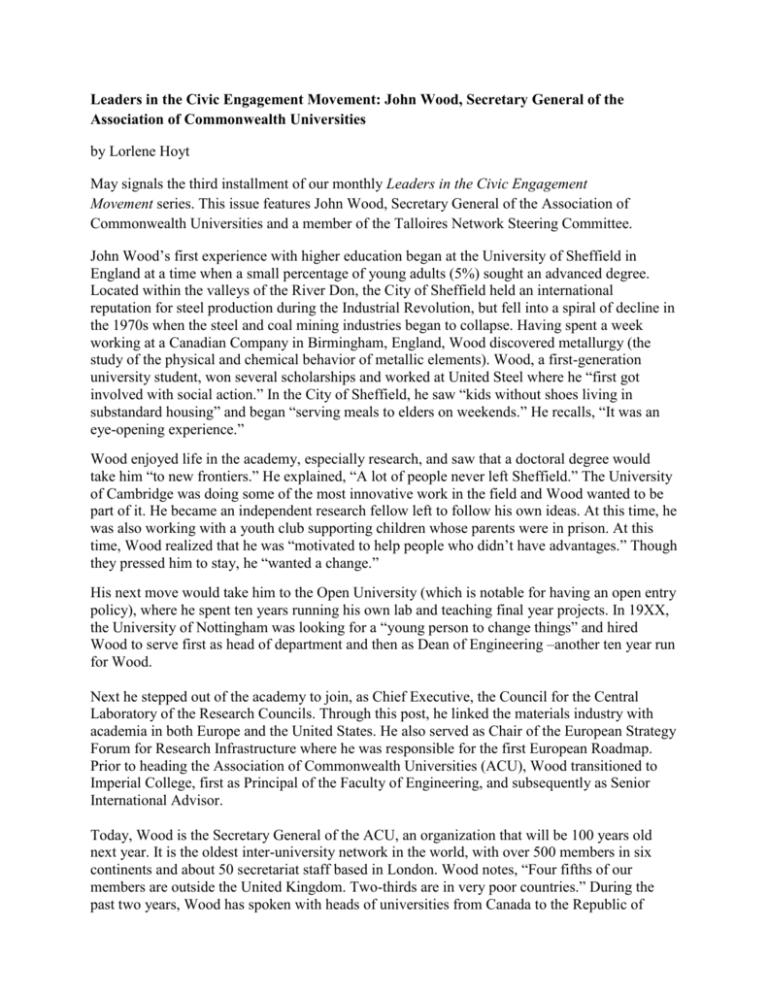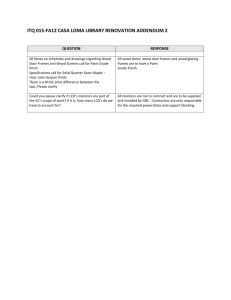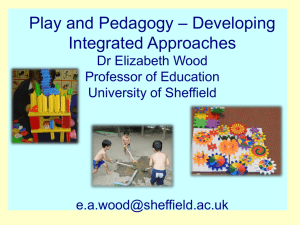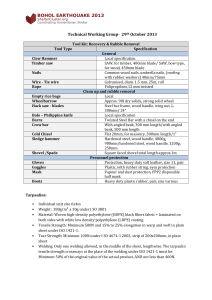John Wood, Secretary General of the Association of Commonwealth
advertisement

Leaders in the Civic Engagement Movement: John Wood, Secretary General of the Association of Commonwealth Universities by Lorlene Hoyt May signals the third installment of our monthly Leaders in the Civic Engagement Movement series. This issue features John Wood, Secretary General of the Association of Commonwealth Universities and a member of the Talloires Network Steering Committee. John Wood’s first experience with higher education began at the University of Sheffield in England at a time when a small percentage of young adults (5%) sought an advanced degree. Located within the valleys of the River Don, the City of Sheffield held an international reputation for steel production during the Industrial Revolution, but fell into a spiral of decline in the 1970s when the steel and coal mining industries began to collapse. Having spent a week working at a Canadian Company in Birmingham, England, Wood discovered metallurgy (the study of the physical and chemical behavior of metallic elements). Wood, a first-generation university student, won several scholarships and worked at United Steel where he “first got involved with social action.” In the City of Sheffield, he saw “kids without shoes living in substandard housing” and began “serving meals to elders on weekends.” He recalls, “It was an eye-opening experience.” Wood enjoyed life in the academy, especially research, and saw that a doctoral degree would take him “to new frontiers.” He explained, “A lot of people never left Sheffield.” The University of Cambridge was doing some of the most innovative work in the field and Wood wanted to be part of it. He became an independent research fellow left to follow his own ideas. At this time, he was also working with a youth club supporting children whose parents were in prison. At this time, Wood realized that he was “motivated to help people who didn’t have advantages.” Though they pressed him to stay, he “wanted a change.” His next move would take him to the Open University (which is notable for having an open entry policy), where he spent ten years running his own lab and teaching final year projects. In 19XX, the University of Nottingham was looking for a “young person to change things” and hired Wood to serve first as head of department and then as Dean of Engineering –another ten year run for Wood. Next he stepped out of the academy to join, as Chief Executive, the Council for the Central Laboratory of the Research Councils. Through this post, he linked the materials industry with academia in both Europe and the United States. He also served as Chair of the European Strategy Forum for Research Infrastructure where he was responsible for the first European Roadmap. Prior to heading the Association of Commonwealth Universities (ACU), Wood transitioned to Imperial College, first as Principal of the Faculty of Engineering, and subsequently as Senior International Advisor. Today, Wood is the Secretary General of the ACU, an organization that will be 100 years old next year. It is the oldest inter-university network in the world, with over 500 members in six continents and about 50 secretariat staff based in London. Wood notes, “Four fifths of our members are outside the United Kingdom. Two-thirds are in very poor countries.” During the past two years, Wood has spoken with heads of universities from Canada to the Republic of Malta, and to find that “the issue of social inclusion comes up time and time again.” In his view, increasing access to higher education is tied to accessing better occupations; of equal importance are the ways in which the diversity of society can access and contribute to the university. Wood explained how many countries are faced with the challenge of redressing entrenched and systematic inequalities based on race, ethnicity, gender and religion as well as social status. For example, the South African Higher Education Act of 1997 seeks to redress “past discrimination” and ensure “equal access,” but among the faculty only 38% of academics in 2008 were black (e.g., African, Indian, ‘colored’) though they comprise 91% of the population. India, too, is committed to addressing the issue of caste and race disadvantage, yet widespread exclusion persists. In Canada, initiatives focus on increasing participation of Aboriginal or First-Nation communities in higher education. In New Zealand, the government emphasizes the need to be culturally responsive to Māori and Pacifica students. Social inclusion looks different in different nations. Wood aims to build on the burgeoning partnership between the ACU and the Talloires Network. Having worked to increase the participation and profile of women in the leadership of higher education by supporting the Gender Conference in Sri Lanka, Wood would now like to coorganize a workshop to raise awareness by helping policy-makers to define and realize their social inclusion objectives. “One wonders about the future,” he concludes, “we need to analyze the situation and explore many options.” In higher education and beyond, he explains, “we need to meet people where they are instead of where we want them to be.” Wood is involved with a number of charities, including acting as chair of the International Network for the Availability of Scientific Publications.





